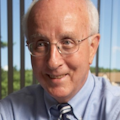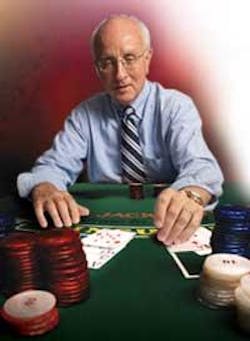Over a seven-week period encompassing September and October, I attended three major international trade shows, each one opening on a day when the world economic news was as bad as it gets. IMTS in Chicago, a biennial machine tool show, was the first, and my colleagues and I entered the halls at McCormick Place with low expectations. We thought the initial fallout from the home mortgage mess, which was damping the stock markets, would potentially cast a pall over the first day. This didn't happen. As I reported in my editorial in the October issue, IMTS was as upbeat and positive as a capital equipment trade show could be, seemingly defying the bad news outside the halls.
Well, I thought, maybe this is just an aberration and we will get a rude awakening in Las Vegas at Fabtech 2008. My colleagues and I were prepared for a "debacle in the desert" brought on by the rapidly expanding bad news from the mortgage lending business, compounded by the show organizers' choice of a new venue and its first location West of the Mississippi in Las Vegas, not known as the industrial capital of North America. As we entered the convention center, wall-mounted monitors were blazing the news of an 800-point drop in the Dow Jones average. Was this the apocalypse? Wrong again. This time documented in the online video of me on opening day and my editorial in the November issue, Fabtech was a roaring success.
As the world financial news worsened I set off to Germany for the world's largest sheet metal fabricating machine show, EuroBlech. Reports of virtual panic in the streets of Germany—as the good burghers lined up at the banks to withdraw their savings—may have been overstated, but the streaming bad news banners on the television were all too real.
If you followed my Website reports from the show floor in Hanover, you know that we were wrong again. EuroBlech set exhibitor and attendance records and, as I found, business prospects, at least in the fabricated metal industry were, dare I say it, even good.
So just what is going on here? The news has not gotten better; in fact as all the global markets react poorly, it is getting worse. And yet in the fabricating world it is business as usual and most of those interviewed claim that their companies will finish 2008 just about on target and in some cases ahead of target. And, perhaps with some real chutzpah, several leading suppliers of industrial laser systems even spoke about a reasonable first quarter of 2009.
When pressed, those I interviewed shared with me information on market sectors that were holding their own in a down economy and even growing in sectors like agricultural equipment, solar power, and medical device manufacturing. Company after company outlined niche markets that were generating sales because their customers had sales commitments that had to be filled using industrial laser processing.
If there was any pessimism on the part of corporate executives, it was that the future—read this as success in the 1Q09—could be an illusion, a bubble that will burst as reality sets in and the economic disaster hits home in the manufacturing sector.
When in Las Vegas at Fabtech I jokingly credited the optimism we found there to gamblers' fever—there is always a chance to be a winner. But the gamblers we saw, for the most part, were a gloomy visaged group, as you would expect of losers. At the shows I mostly saw smiles on the faces of both exhibitors and attendees. And, as a long-time observer, I use this as a measure of business success.
About the Author

David Belforte
Contributing Editor
David Belforte (1932-2023) was an internationally recognized authority on industrial laser materials processing and had been actively involved in this technology for more than 50 years. His consulting business, Belforte Associates, served clients interested in advanced manufacturing applications. David held degrees in Chemistry and Production Technology from Northeastern University (Boston, MA). As a researcher, he conducted basic studies in material synthesis for high-temperature applications and held increasingly important positions with companies involved with high-technology materials processing. He co-founded a company that introduced several firsts in advanced welding technology and equipment. David's career in lasers started with the commercialization of the first industrial solid-state laser and a compact CO2 laser for sheet-metal cutting. For several years, he led the development of very high power CO2 lasers for welding and surface treating applications. In addition to consulting, David was the Founder and Editor-in-Chief of Industrial Laser Solutions magazine (1986-2022) and contributed to other laser publications, including Laser Focus World. He retired from Laser Focus World in late June 2022.
